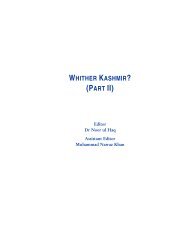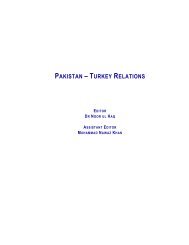An Overview of British Administrative Set-up and Strategy in the ...
An Overview of British Administrative Set-up and Strategy in the ...
An Overview of British Administrative Set-up and Strategy in the ...
Create successful ePaper yourself
Turn your PDF publications into a flip-book with our unique Google optimized e-Paper software.
84 Javed Iqbal<br />
Afridis under control. 23 If at all it could be termed as “blackmail”, it was<br />
blackmail on both <strong>the</strong> sides; <strong>the</strong> tribesmen mak<strong>in</strong>g <strong>the</strong> <strong>British</strong> pay <strong>the</strong>se<br />
allowances <strong>and</strong> <strong>the</strong> <strong>British</strong> mak<strong>in</strong>g <strong>the</strong>m return <strong>the</strong> favour by keep<strong>in</strong>g <strong>the</strong> Pass<br />
safe for traffic or else, <strong>the</strong>y would stop <strong>the</strong> payments.<br />
Apart from <strong>the</strong> stoppage <strong>of</strong> allowances, <strong>the</strong>re was b<strong>and</strong>ish or blockade –<br />
exert<strong>in</strong>g economic pressure by exclud<strong>in</strong>g a tribe from markets, l<strong>and</strong> or graz<strong>in</strong>g<br />
<strong>in</strong> <strong>the</strong> neighbour<strong>in</strong>g district. This method was quite effective but slow <strong>and</strong><br />
hard to enforce as <strong>the</strong> adm<strong>in</strong>istrative border between <strong>the</strong> settled districts <strong>and</strong><br />
ghair illaqa (<strong>in</strong>dependent tribal territory) was <strong>of</strong>ten artificial <strong>in</strong> <strong>the</strong> sense that it<br />
meant little to <strong>the</strong> people on ei<strong>the</strong>r side <strong>of</strong> <strong>the</strong> l<strong>in</strong>e. 24<br />
Yet ano<strong>the</strong>r method to enforce good behaviour was <strong>the</strong> bramta or<br />
barampta, a word <strong>of</strong> Central Asian Turki orig<strong>in</strong> mean<strong>in</strong>g <strong>the</strong> seizure <strong>of</strong> persons,<br />
animals or property belong<strong>in</strong>g to a tribe to exert pressure for restitution. This<br />
method was applied under <strong>the</strong> pr<strong>in</strong>ciple <strong>of</strong> <strong>the</strong> Collective Responsibility <strong>of</strong> <strong>the</strong><br />
tribes for any wrongdo<strong>in</strong>g by any <strong>of</strong> its members or <strong>the</strong> tribe as a whole. The<br />
bramta technique worked only if applied to <strong>the</strong> tribal section actually<br />
responsible for any <strong>of</strong>fense or to which <strong>of</strong>fenders actually belonged. The<br />
smaller <strong>the</strong> tribal gro<strong>up</strong> or section was on which pressure was put, <strong>the</strong> more<br />
effective it proved <strong>in</strong> yield<strong>in</strong>g results. 25<br />
In <strong>the</strong> Khyber Pass area, a local levy, <strong>the</strong> khassadar Force, was<br />
established for <strong>the</strong> purpose <strong>of</strong> polic<strong>in</strong>g <strong>the</strong> area. Only <strong>the</strong> khassadars <strong>and</strong> not<br />
<strong>the</strong> army or militia could directly deal with <strong>the</strong> tribes <strong>and</strong> go to <strong>the</strong> villages for<br />
summons etc. At <strong>the</strong> same time, for <strong>the</strong> purpose <strong>of</strong> deal<strong>in</strong>g with <strong>the</strong> local<br />
tribes, a representative class called maliks was also created. The village elders<br />
were also recognized as <strong>in</strong>termediaries between <strong>the</strong> government <strong>and</strong> <strong>the</strong>ir<br />
villages <strong>and</strong> clans. Recruitment <strong>in</strong> <strong>the</strong>se multiple forces, <strong>the</strong> roads <strong>and</strong> railways<br />
contracts <strong>and</strong> construction works <strong>of</strong>fered tremendous employment<br />
opportunities to <strong>the</strong> poor <strong>and</strong> penniless local tribals. The maliks <strong>and</strong> o<strong>the</strong>r<br />
elders <strong>of</strong> <strong>the</strong> tribes were given h<strong>and</strong>some allowances <strong>and</strong> subsidies (muwajib).<br />
The l<strong>and</strong> requisitioned for roads <strong>and</strong> railways <strong>and</strong> o<strong>the</strong>r government concerns<br />
were acquired aga<strong>in</strong>st cash annual payments. In this way, <strong>the</strong> <strong>British</strong> brought<br />
about a socio-economic transformation among <strong>the</strong> local tribes. But though<br />
somewhat settled <strong>and</strong> subjugated <strong>the</strong> tribals were not completely tamed. They<br />
were left with a real sense <strong>of</strong> <strong>in</strong>ternal <strong>in</strong>dependence <strong>and</strong> <strong>the</strong>ir centuries’ old<br />
traditional tribal code, Pakhtunwali or riwaj rema<strong>in</strong>ed immune to undue<br />
<strong>in</strong>terference. No attempt was made to replace <strong>the</strong> local customary laws by <strong>the</strong><br />
<strong>in</strong>troduction <strong>of</strong> English or Roman law, as was done all over <strong>the</strong> rest <strong>of</strong> <strong>the</strong><br />
Indian Subcont<strong>in</strong>ent. They were spared <strong>the</strong> agonies <strong>of</strong> litigation, trials,<br />
23 Ibid., 349-50.<br />
24 Ibid., 350.<br />
25 Ibid.




